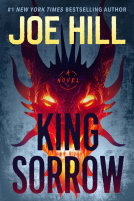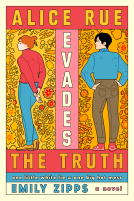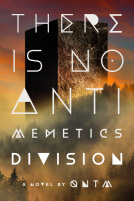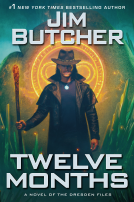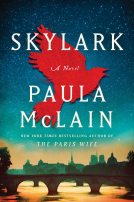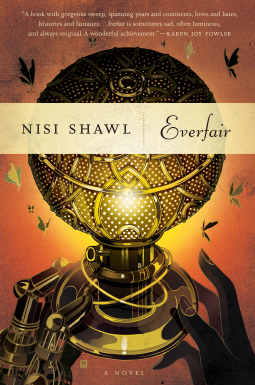
Everfair
A Novel
by Nisi Shawl
This title was previously available on NetGalley and is now archived.
Send NetGalley books directly to your Kindle or Kindle app
1
To read on a Kindle or Kindle app, please add kindle@netgalley.com as an approved email address to receive files in your Amazon account. Click here for step-by-step instructions.
2
Also find your Kindle email address within your Amazon account, and enter it here.
Pub Date Sep 06 2016 | Archive Date Dec 13 2023
Macmillan-Tor/Forge | Tor Books
Description
From noted short story writer Nisi Shawl comes a brilliant alternate-history novel set in the Belgian Congo.
What if the African natives developed steam power ahead of their colonial oppressors? What might have come of Belgium's disastrous colonization of the Congo if the native populations had learned about steam technology a bit earlier?
Fabian Socialists from Great Britain join forces with African-American missionaries to purchase land from the Belgian Congo's "owner," King Leopold II. This land, named Everfair, is set aside as a safe haven, an imaginary Utopia for native populations of the Congo as well as escaped slaves returning from America and other places where African natives were being mistreated.
Shawl's speculative masterpiece manages to turn one of the worst human rights disasters on record into a marvelous and exciting exploration of the possibilities inherent in a turn of history. Everfair is told from a multiplicity of voices: Africans, Europeans, East Asians, and African Americans in complex relationships with one another, in a compelling range of voices that have historically been silenced. Everfair is not only a beautiful book but an educational and inspiring one that will give the reader new insight into an often ignored period of history.
Available Editions
| EDITION | Other Format |
| ISBN | 9780765338051 |
| PRICE | $26.99 (USD) |
Average rating from 35 members
Featured Reviews
 Fran E, Reviewer
Fran E, Reviewer
What if steam technology was available to the Congo in the late 19th century? Could the atrocities in Equatorial Africa have been minimized or prevented? Author Nisi Shawl uses the steampunk genre to spin an alternate history by building the settlement of Everfair.
Under the rule of King Leopold II, the populace is decimated. The king's henchmen whip, murder, and kill innocent villagers, children included. A new and profitable export, rubber, has become vital to the Belgian king, The enslaved villagers perform dangerous grueling jobs. Refusal to work might cause one's hand to be severed or wife strangled.
Under the auspices of the socialist Fabian Society from Europe, Catholic missionaries and home bred Africans, a safe haven called Everfair is created. This resettlement project will rescue indigenous people, those of mixed heritage and freed slaves returning to Africa. Everfair will be a land of peace and harmony, free from tyrants. Will the melting pot of residents share equally and live in freedom?
A large cast of characters frequent Everfair. Writers, actors, scientists, political activists, prosthetists and missionaries abound.. It was difficult to keep track of the many players, however, Daisy, Lisette, and Josina stand out as exceptions.
Niri Shawl has crafted an engaging, speculative tome about a dark, tumultuous period in history.
Thank you Macmillan-Tor/Forge for the opportunity to read and review "Everfair"..
 Rosalyn S, Educator
Rosalyn S, Educator
To say I was excited to read a steampunk novel that featured character of color was putting it lightly. I hoped that they would not fall to the wayside of noble or authentic pieces of caricature...and I am happy to report that it was a wonderful fantastic read. It is definitely a keeper for its beautiful narrative, intriguing plot, layered look at the social ramifications of colonization and its unique format.
 Jenny H, Media/Journalist
Jenny H, Media/Journalist
Note: I received an e-galley of Everfair from the publisher for review consideration.
The genesis of Nisi Shawl’s debut novel Everfair was the author’s bafflement that she had never gotten into steampunk, and her theory that the reason for this is steampunk’s uncomfortable connections with colonialism. Everfair, therefore, creates an alternate version of Congolese history in which white and black Europeans and Americans purchase land in the Congo to create a small country called Everfair. The residents of Everfair develop steam technology that allows them, in alliance with the indigenous king of the Everfair territory, to chase out King Leopold’s forces. Everfair follows the creation and development of this country over the course of thirty years.
Oh gosh. Ohhhhhh gosh. Please hold while I lie on the floor and catch my breath over the greatness of this book. Oh, where to begin. How shall I count the ways in which Everfair won my heart? I looooooved this book. It’s wonderful on its own merits, and it also made me feel excited for the ever-expanding (I hope) globalism of contemporary fantasy.1 Shawl writes from multiple viewpoints in a way that extends compassion to every character, but gives nobody a pass on their blind spots. The project of nation-building inevitably includes casualties, and Shawl never shies away from that truth, even when her characters do.
(Did you read The Just City? Did you like The Just City? This is kind of like that! But with more dirigibles, and in nineteenth-century Congo.)
If I had a complaint with Everfair, it’s that I wasn’t entirely ready for the way it makes large jumps in time and place. The chapters are short, which at first made it challenging for me to settle in comfortably to the point of view and time period of each one, and successive chapters are frequently set months ahead of the chapters that came before. This is doable — you have to pay attention to the chapter headings that let you know where and when the action is happening — but it was a little difficult for me to adjust to, right at first. It also gives rise to the kind of situation where one chapter will see the characters debating a heavily contentious issue of serious strategic significance, and the next will find you six months on, with that whole problem resolved and in the past.
However, Nisi Shawl is careful to catch you up to what’s happening, in ways that almost never feel like visits from the exposition fairy, and the benefit of this type of writing is that we truly get to see the growth and changes in Everfair over a course of decades. At first, there’s a degree of unity among the residents of Everfair: The most important thing for African, East Asian, European, and American Everfairians2 alike is to save as many people from King Leopold’s brutal rubber trade as possible, and ultimately to drive the Belgians out of the Congo.
But what truly made my heart sing3 was the second half, in which the priorities, loyalties, and demands of the different groups of stakeholders begin to conflict with each other. Shawl is respectful of everyone, laying out as fairly as possible the feelings and claims of the indigenous people of Everfair and its colonizers. She doesn’t try to find silver bullets for the problems in the world she’s created: Yes, the settlers were vital to driving out the Belgians; and yes, they shed blood and made their homes in Everfair; and still, the land belongs first and primarily not to Daisy Albin of England or Martha Hunter of America, but to King Mwenda and his people.
With all of this, Shawl brings her book to a conclusion that might be argued to be slightly too neat. When, after all, did competing land claims ever settle themselves bloodlessly? But there’s something revolutionary about a story of African colonialism in which opposing interests are able to find a peaceful middle ground.
I’ve been crazy psyched about this book — which really seems to cater to 100% of my interests — since December of last year, and it did not disappoint. Everfair! Read it and come back and squee with me!
Readers who liked this book also liked:
qntm
General Fiction (Adult), Mystery & Thrillers, Sci Fi & Fantasy

